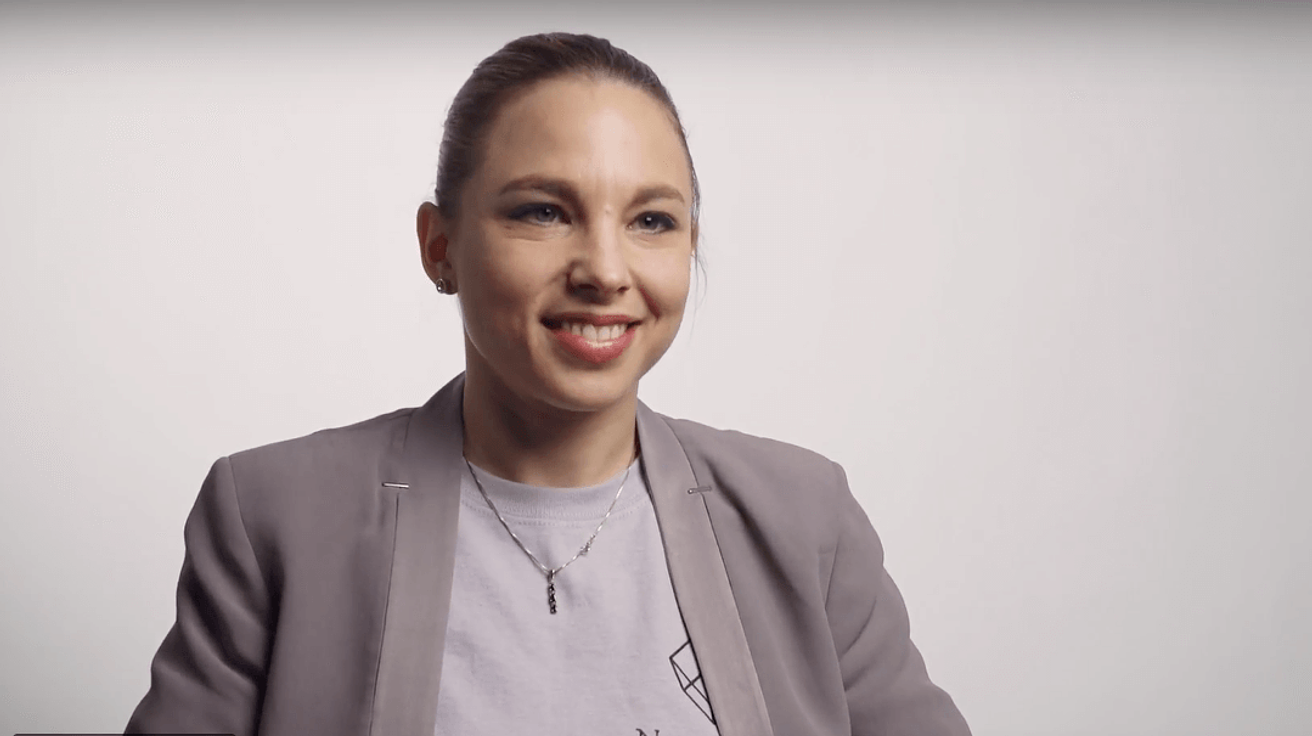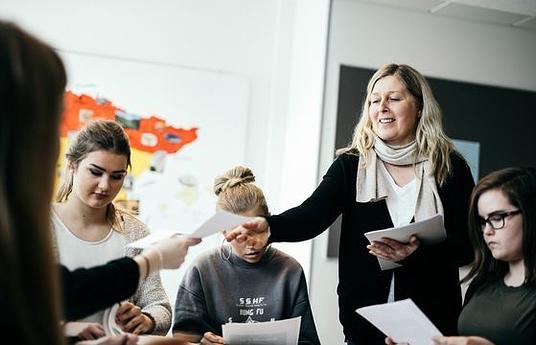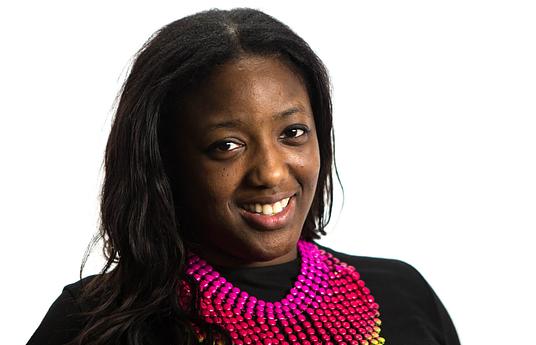Dr Becky Sage is CEO of Interactive Scientific Ltd, a company working to make science communication fun and accessible to all. Interactive Scientific's innovative Nano Simbox provides an exploratory digital platform to immerse users in the world of atoms and molecules.
Do you feel that the current way we are educating children fully prepares them for the needs of the 21st century?
I don’t feel like the way we are educating children at the moment fully prepares them for what’s expected of us as adults and I think part of that is because everything changes so quickly. We’re in this world where everything is changing so quickly and nobody really knows what to do with that, nobody knows how to take what’s going on when a child is up to the age of 18 and transfer that into the world they’re going to exist in when they are adults.
I think there still seems to be very much delivery of “this is the information and knowledge and here you go we’re giving it to you.” Whereas that’s not the skill set anyone needs anymore - if you want to find information, you can find information now, that’s not the challenge! The challenge is how do you have the skills to validate the information, to work in collaborative ways, think creatively about the things we’re facing and think with social issues in mind? There’s a lot of social challenges that need to be solved and that generation needs to solve them.
Digitalization is important because you can grow new types of communities. We [Interactive Scientific] create digital tools, which are around science learning and the digital part for us takes on 2 realms. One is we can create a world that students wouldn’t otherwise be able to see. We look at atoms and molecules and we can allow students to really experience that in a way like never before, so that’s a real positive of digital delivery of things. Whereas back when I was at school, everything was in a textbook (you might be able to see things in animation or video) but now we can create something that is a fully immersive environment, so students can experience something very quickly and learn very quickly about an abstract concept. So that’s one side of it, about getting to the content they might not otherwise be able to get to.
Like I said, the other side of it is all about how you deliver that as a community. For me, that’s what’s really interesting about digital and certainly what we’re nurturing is how can you replicate things that as a team we can do on a small scale, on a much wider scale?
For example we have a science educator network, so we work with a small group of really passionate science teachers. Obviously without digital that’s a wonderful thing because you can do that in a real face to face, organic manner. But you can’t reach that many people and so with social media and all the rest of it, it’s kept people connected and created connections on a much wider scale.
I think that’s something we can do, for us it’s not even about just reaching globally, it’s how can you create a different type of eco-system? So, for example in science, schools are really quite disconnected from research or industry and with digital there’s definitely a way we can pull that altogether more. And actually, in the community as well, so you’ve got community, industry and research and education and digital potentially has the power to make that a picture that all fits together, rather than something that’s always been quite separate.
What is the role of the teacher?
I’ve worked with many passionate science educators and for me, they’re the ones that show me the light and they are all about creating space for their students to explore. One of them tells the story about how she likes to trim the fat and not the fun. So how can she create space not just for her students but for the other teachers in her department to do the fun things? Sometimes that’s just about doing the fun things and letting them take priority! When we say fun sometimes that’s just letting kids run around a bit and giving them space but also letting them have more creative approaches to what they’re doing. It’s not just about delivery of the same lesson that’s been done twenty times.
So, I think the role of the teacher is to allow students to see things from lots of different perspectives and to help students to overcome challenges, to be a connection.
I think something that a lot of teachers do find quite hard is they say their students just see them as ‘something’, they don’t see them as human beings, just as somebody who is just there because that’s where they are and that’s where they have to be– with them in the classroom for an hour or something. So that challenge of a teacher becoming someone that can connect their students to something bigger. That’s something I’ve seen again with these really great teachers we work with that’s what they’re trying to do all the time – are there outside influences, are there ways they can get their students to tell stories or explores skills that are outside of just delivering towards an exam curriculum?
Because I’ve come from an academic background and a bit of the business world as well, there’s always been conferences and events where you go and share peer to peer and it becomes a collaboration. It’s actually something we recognised when we first started doing a lot of our work - teachers don’t get this opportunity! When does a classroom teacher or head of science really get to go out and be in more of free space to collaborate?
So, we did actually run this event and we brought 20 teachers together and we did creative workshops and talks and did a dinner like you would at an academic or business conference, so they had a chance to get to know each other and be relaxed around one another and have that peer to peer support which I think is really, really important.
It’s been a very positive experience for us to be able to see that happen and see that come to fruition. The very first morning of this event in the break the teachers came over to me and said ‘Becky this has to keep going! This can’t stop here, we need to do something!” for me, that was one of the really proud moments of the work we’ve done, so I think it would be really great if teachers had that chance. Again, perhaps digital could facilitate this more, whether there are virtual communities that have peer to peer support?
I’m very aware of the fact there are so many teachers that feel that they are so against it all, that anything outside of what they’re used to doing and their normal day to day routine and schedule feels impossible for them to tackle. I think it would be amazing if that’s the way we could go, although there’s probably a journey to go on to get to that point.
What do you think the most exciting or effective learning environment would be?
I really like space around learning and creating a safe creative space for learners. It’s interesting because I’ve talked to people about the implementation of various different methodologies in terms of how they use space, like more open class models, and I’ve heard differing opinions from teachers who’ve tried it out in the classroom.
Because my background has been more informally coming into a classroom, I’ve always been very lucky to be able to deliver physical space like being in a hall, so you can have some movement and have creative things going on that support the delivery of the more in-depth learning and allow the students to think and so it’s more of an ideal situation.
I know space is a very broad word but I do think there’s something about creating an environment where a student feels they can expand and grow into it. We work a lot with digital tools but certainly when we run workshops with the digital tools we always try to make them part of something bigger.
I think for me; a purely digital space isn’t one that I would like to learn in and it’s not one that I think is necessarily the best way for the majority of people to learn in. But I think that having something where you’ve got space for very organic ways of doing things as well as really digital ways of doing things, that does allow physicality and movement and expansion, I think it’s important.
Do you think standardized testing is the most effective way to judge learning?
I think standardized testing is a way and I definitely don’t think it should be done on its own. It’s interesting because I think it’s really easy and definitely my opinion is: why did we just learn for the exams, what is that teaching us for connection and to get out into the real world? Just from my personal experience, I was someone who excelled in science so standardized testing was basically the thing I learned to do and that was the skill set that I nurtured for myself when I was growing up.
I got to the end of my first degree and I thought ‘great I’ve managed to nail that whole doing the exam thing!’ and then everything else I was absolutely petrified of and I didn’t know how to explore the world in a way that was outside of that. And you have to! Whenever the end of that exam period is for you, you have to go out there and explore the world in a different way and so the fact that everything is driven towards that is not very helpful.
The more I do reflect back I realise it’s brain training. That’s why I say there probably is still space for it because that’s part of what we need to be able to do – to switch on our brain, make it work quickly and retain information, but I think moving to more task-based assessment and this is something we’ve been thinking about a lot, is somebody who’s good at standardized tests is one type of thinker and it’s not great preparation for the rest of the world and it also excludes a lot of people. I think it’s not great for people who achieve it but also those who don’t achieve it.
Because we have a very playful approach to learning science and a lot of what we’re trying to do is really get away from ‘science is this black and white thing where somebody knows all the answers and then someone has to prove they know the answers’. Exams and standardized testing do that wonderfully – this is a thing that I have to know the answers to and it’s either right or wrong.
The truth is - science is all about exploration, it’s all about play, about pushing things to the next place. We live in such a changing world we need to know how to deal with change and things we don’t understand and how we explore those things. Curiosity, exploration, they’re skills we really need to nurture.
It’s getting this balance right and this is where new technology is really going to help. How do you define that somebody has explored something or gone on some kind of creative process that has allowed them to get somewhere, that shows that they are learning something?
What role do you think the government should play in education?
It’s always tricky in terms of governance because I would love to say I think people like me and our company should get to be part of creating this new vision of what education should be, these passionate science teachers we work with, the students in school right now, the employers employing not just in the big companies but in all sorts of environments should be the ones that get a chance to set how that vision for the future.
How one decides who is a valid person to make those decisions and who is not is obviously the tricky part of that equation because it’s always going to come down to people and what their goals are, what their motivations are within education.
I think the government having a role in education is a helpful thing because it enables things to be uniform and can enable best practice in theory, to infiltrate and get out there across the schools, but equally, it can become a blocker to really great things that are happening and it really does go back to what’s education for and who are you reporting to?
The fact that so many teachers really do feel this pressure of ‘I’ve just to get to the exams’ – so any kids just have that pressure – and I think that’s partly because there’s this top-down approach.
I think the other thing is education being something that’s much bigger than the formal system, that actually we’re all learning all the time and actually there are different ways – it’s interesting to look at some of those more non-formal areas of education and seeing where best practice can be brought in around governance and quality assurance within education.
In your experience, can an innovation that works in one place work in another?
Yes – I can be very specific around our work with this. Our technology is all about bringing atoms and molecules to life, it's built on research science, so our big driver around that is how can you give something to students that is an environment for them to explore that’s not built on a misconception.
With science learning, you get a lot of “this is what we’re going to teach you for this exam right now” and then you go onto the next phase and “actually forget all the stuff you’ve just learned, we’re now going to teach you the next thing.” It’s not giving the kids the respect that they could actually deal with the real stuff. You can, you just have to deal with it in a different way, like making it visual.
Our innovation started in a science lab so the underpinnings of it are all about how a scientist predicts molecular behavior, although they didn’t really care about how that was delivered and shown. From that, it turned into a science communication project which then turned into an education project because we noticed how much impact it was having in schools.
What’s been really interesting is because we’ve developed something that’s more understandable, taking the complex stuff and hiding bits of complexity where necessary, making it palatable and accessible – the research world has seen what we’re doing in education and said: “oh we want this!” So that has shown that what we develop in terms of our specific innovation for education is actually really interesting for the research world as well.
That’s a specific innovation but that gives it the power because you’ve then got feedback between what’s going on in education, industry and research and in fact they can feed each other.
There are all kinds of exciting things you can then do with the fact that something is working in education and industry because you can then use that as a portal to crowdsource scientific problem-solving.
We’re using hardware – gaming technology, virtual reality and different types of hardware – that even in itself is what has given the wow factor that’s really lifted it off the ground. We do a lot of pulling innovation from one place to another and we’ve done the same thing in terms of practice and process as well. Lots of co-creation process, taking artistic practice and applying that to scientific innovation which is really interesting. Also pulling in lots of multidisciplinary people and that’s where you get the really interesting things. It is about taking little innovations in different fields and bringing them together.
What was your favourite moment or experience in your own K-12 education?
I’ve got a couple – my favourite moment in terms of an outcome was I got an A in my GCSE drama and I wasn’t expecting to. I was very unconfident and I ended up choosing all the sciences and that was partly because I wasn’t confident in terms of being a creative person and I didn’t want to put myself out there at all. I think a lot of teenagers are like that. I loved drama and I did it outside of school and loved it there because I could hide in it but in school, I couldn’t do it.
I’ve got some really good memories of one of my history teachers who was a storyteller and those lessons are the ones that stand out more than anything else because he would just tell us stories and he was somebody I can remember. He was so laid back and down to earth with it and he obviously used to use creative approaches to getting us to explore historical content. That was a really cool part of my education.
The next 100 years of education should…. break down the silos between the formal education environment and the world that we live in outside of that. I mean that more than just connecting with some big industry partners, it needs to be about how are generations talking to each other, how can we use that as a way to educate people, how can we use solving social challenges as a way to educate people? It’s all about breaking down those walls.


